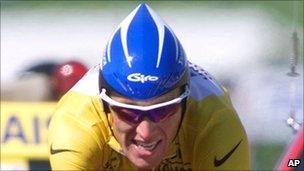Lance Armstrong used drugs, claims Tyler Hamilton
- Published

Armstrong has never failed a drug test
A former team-mate of cyclist Lance Armstrong has claimed the seven-time Tour de France winner used the performance-enhancing drug EPO.
Tyler Hamilton rode with Armstrong in the US Postal team and says they both used EPO during the 1999 Tour.
Armstrong, who has consistently denied the many such allegations made against him, said on his Twitter page: "Never a failed test. I rest my case.", external
Hamilton, 40, served a two-year ban for so-called blood-doping from 2005-2007.
"I saw [EPO] in his refrigerator... I saw him inject it more than one time like we all did," Hamilton told the CBS programme 60 Minutes. "Like I did, many, many times."
Erythropoietin (EPO) is a hormone naturally produced by the kidneys. It is injected under the skin to stimulate red blood cell production, and its overall effect is to increase endurance.
Armstrong's spokesman Mark Fabiani said in a statement: "Hamilton is actively seeking to make money by writing a book, and now he has completely changed the story he has always told before so that he could get himself on 60 Minutes and increase his chances with publishers.
"But greed and a hunger for publicity cannot change the facts: Lance Armstrong is the most tested athlete in the history of sports. He has passed nearly 500 tests over 20 years of competition."
Allegations of the use of banned substances by members of the US Postal team are still the subject of a federal investigation in the United States.
Hamilton claimed it was that investigation which prompted his decision to admit his use of performance-enhancing drugs.
In an open letter to his friends and family published by various media outlets, he said: "Last summer, I received a subpoena to testify before a grand jury. Until that moment I walked into the courtroom, I hadn't told a soul [about my doping].
"My testimony went on for six hours. For me, it was like the Hoover Dam breaking. I opened up; I told the whole truth, and nothing but the truth. And I felt a sense of relief I'd never felt before."
It was also revealed on Friday that Hamilton has handed back the gold medal he won in the time-trial at the Athens Olympics. Hamilton was allowed to keep it despite testing positive for blood doping because the laboratory accidently destroyed his B sample by deep freezing it, leaving too few red blood cells to analyse.
"I can confirm that Tyler Hamilton has given his gold medal from the 2004 Athens Olympic Games to Usada [US anti-doping agency] and that we will continue to work with the IOC [International Olympic Committee] and the USOC [US Olympic Committee] as appropriate concerning the final implications of our overall investigation," Usada chief executive Travis Tygart said in a statement.
The IOC said earlier on Friday it also was studying the issue.
"The IOC has taken note of Hamilton's confession and will of course study any potential Games-related implications," it said.
Hamilton is the latest in a list of former team-mates and associates to accuse Armstrong of cheating.
In 2010, Floyd Landis launched a series of allegations against Armstrong, with whom he rode in the US Postal team for several years, claiming he had used banned substances throughout his career.
Landis won the 2006 Tour de France but was later stripped of his title after a sample he gave following a stage win tested positive. He protested his innocence until 2010 but then admitted to systematic doping.
Armstrong won the Tour de France for seven consecutive years from 1999-2005. He retired following the last of those triumphs.
The Texan returned to ride in the 2009 race and finished in a creditable third place. He competed in it again in 2010 but could only manage 23rd, although he helped his RadioShack team win the team competition.
Earlier this year, the 39-year-old announced his retirement from competitive cycling.